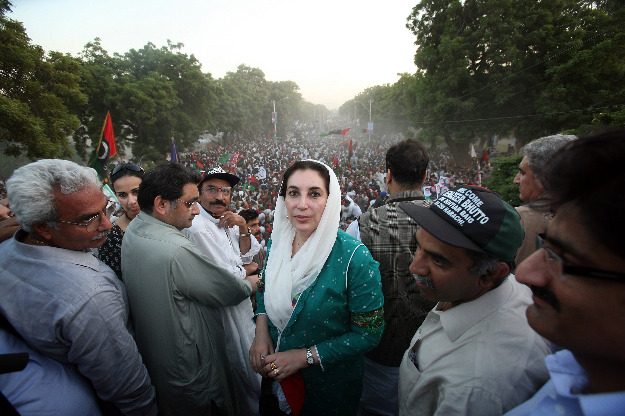|
 By Kalsoom Lakhani By Kalsoom Lakhani
This past Tuesday, I attended the Washington, D.C. premiere of Bhutto, the documentary about the life of the late Benazir Bhutto, Pakistan's first female prime minister, held at the National Geographic Society. The PBS Independent Lens film, directed by Duane Baughman and produced by longtime Bhutto friend and spokesman Mark Siegel, promised to be "a portrait of one of the most fascinating and complex figures of our time."
Originally published by Foreign Policy
The film lived up to its promise. It was moving, powerful, and successfully humanized a woman and a family that have been an integral part of Pakistan's history and political landscape.
The strength of Bhutto lies in its ability to capture the personal life and loss of Benazir and the Bhutto family, including her father, former Prime Minister (and President) Zulfikar Ali Bhutto, her brothers Murtaza and Shah Nawaz, her mother Nusrat, and her sister Sanam Bhutto. The film includes interviews with a number of analysts of and characters in Benazir's story, including Sanam Bhutto, Victoria Schofield, Christina Lamb, Reza Aslan, Tariq Ali, Steve Coll, Arianna Huffington, Shuja Nawaz, Akbar Ahmed, Asif Ali Zardari, Peter Galbraith, Mark Siegel, and Benazir Bhutto's uncle, Ahmad Ispahani. Bhutto was also at times narrated by the voice of Benazir Bhutto, via a never-before-released audiotape, and included moving clips with her children, Bilawal, Bakhtawar, and Asifa.
As a result, the Bhutto clan, whose story has often been likened to a Greek tragedy, is unveiled to the audience as characters in a fascinating narrative. The anecdotes make the family profoundly relatable, and include choice quotes like, "I am not arrogant, I'm intolerant of stupid things," by Zulfikar Ali Bhutto, and Benazir describing how her father said she "looked like Mussolini" in a newspaper photo of her with Zulfikar Ali Bhutto and Indira Gandhi in 1972.
The most powerful part of Bhutto, though, was the lead-up to her death. Every Pakistani experienced the loss of Benazir Bhutto, who was assassinated during a political rally in Rawalpindi, Pakistan on December 27, 2007. Regardless of how you feel about her policies, Bhutto's death was a tragedy because no other leader shared her conviction or her courage. As her children noted in the film, their mother returned to Pakistan with an air of finality and determination, despite others begging her not to go. For a woman who had already lost so much, her return to Pakistan was her final sacrifice.
While Bhutto was therefore a strong portrayal of Benazir Bhutto, the woman, the mother, the daughter, the leader, and the fighter, it was nevertheless a one-sided and subjective treatment of Pakistan's history, as well as of Benazir Bhutto, the Prime Minister.
The film documents Zulfikar Ali Bhutto's rise to power -- the formation of the Pakistan People's Party as a populist political party with the slogan "Food, Clothing and Shelter" (Roti, Kapra aur Makan), and how he later "swept the polls" in the 1970 elections to become Pakistan's new leader.
Except that's not exactly what happened. Yes, Zulfikar Ali Bhutto won the majority of seats in West Pakistan. But Mujib ur-Rahman, leader of the Awami League, swept the polls in East Pakistan (what is now Bangladesh), ultimately winning the overall majority in the National Assembly. Bhutto refused to accept these results, and the subsequent denial of East Pakistan's political rights and autonomy ultimately led to the 1971 war. The film also glossed over the details regarding this war, focusing more on the Indian intervention (on behalf of East Pakistan), than the atrocities committed against the Bengalis or the later establishment of Bangladesh.
Throughout Bhutto, critical voices of Benazir Bhutto were highlighted, but were also simultaneously discounted. For example, when the film touched on the assassination of Benazir's brother, Murtaza Bhutto, his daughter and Benazir's niece Fatima Bhutto was filmed emphasizing her belief that her Aunt Benazir was complicit in the murder. However, her testimony was promptly undermined by interviews with Mark Siegel and Sanam Bhutto, Benazir's younger sister, who said Fatima was very "angry" for what happened to her father. Sanam, in her interview, further emphasized, "You will never see Fatima, granddaughter of Zulfikar Ali Bhutto, or daughter of Murtaza Bhutto. She is always written as Benazir Bhutto's niece. She is nothing without my sister."
The well-known corruption charges associated with Benazir Bhutto's husband, Asif Ali Zardari, the current President of Pakistan, were also discounted in Bhutto. Instead, the film framed Zardari's title, "Mister Ten Percent" as part of a PR campaign orchestrated by the Inter-Services Intelligence (ISI). Rather than interviewing well-known and credible voices that could have helped show both sides of the story, Bhutto instead depicts Zardari as a political victim, a portrayal supported further by interviewees in the movie.
Bhutto therefore glosses over the snags in Pakistan's history where Benazir Bhutto could be seen in a negative light and instead focuses on the positive attributes of her life and journey. As a result, the film is more of a hagiography than an honest documentary, immortalizing a courageous woman who held steadfast to the conviction, "Democracy is the best revenge." While such a portrayal is undoubtedly moving and inspirational, it also fails to scratch the surface of the complexities of Pakistan's political landscape and society. It falls short of asking the questions of accountability and transparency Pakistan really needs to move forward.
Published on Friday 2nd July 2010
|





